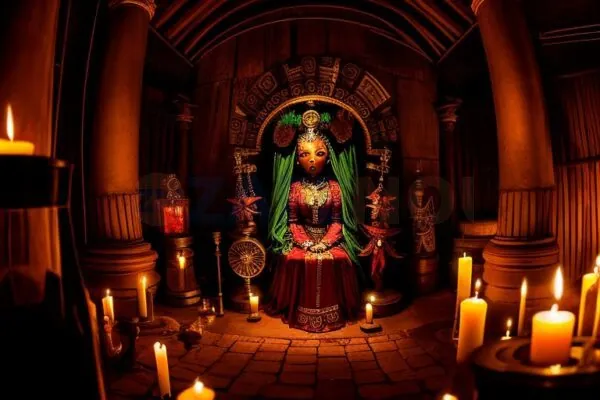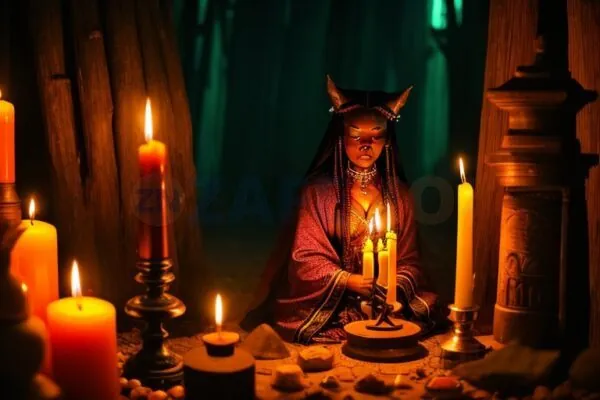Voodoo is a mystical and multifaceted religion that originated in West Africa. It later expanded into the Caribbean, Louisiana, and other areas as African slaves brought their beliefs with them.
Voodoo has a rich culture with varied rituals, music, and dance traditions. At its core is the invocation of powerful spirits called Loa or Lwa.

Voodoo names frequently pay tribute to these venerated deities and energies. The names derive from African languages like Yoruba, Fon, Igbo, Ewe, and Kikongo.
Haitian Creole, Louisiana Creole, and French dialects have also influenced Voodoo names. Each moniker carries deep symbolism, identity, and spiritual potency.
The Significance Behind Voodoo Names
In Voodoo belief, bestowing a child or devotee with the name of a Loa spirit invites that entity’s protection and sacred attributes into their lives.
As the child grows, the Loa’s vital energy and virtues will flow through them. Voodoo names also forge a bond between the individual and the spiritual world. This serves as a source of guidance, empowerment, and purpose.
Adults may adopt Voodoo names later in life to align with certain spirits or mark their spiritual journey. The name reflects their devotion to Voodoo and its pantheon of Loa, who offer knowledge, healing, and blessings.
Voodoo’s Divine Pantheon of Spirits
Here are some of the most venerated deities and spirits within Voodoo culture and their associated names:

Papa Legba, The Divine Messenger
Papa Legba is an esteemed intermediary within the realm of Loa figures. He fulfills the crucial role of bridging the gap between humanity and the spiritual realm.
By serving as an intermediary, he opens the gateway that connects the mortal world to the divine realm of God. This enables practitioners to establish communication with the world of spirits, making Papa Legba an essential figure in the initiation of rituals, ceremonies, and magical work.
Baron Samedi, Master of Death
As leader of the Guédé family of Loa, Baron Samedi is the powerful spirit of death and resurrection. He presides over cemeteries and the transition between the living and dead. Depicted with a skull face and top hat, he is the guardian of ancestral wisdom.
Maman Brigitte, The Eternal Queen
Maman Brigitte is the female counterpart to Baron Samedi. As Loa of the Dead, she is often syncretized with the Celtic goddess Brigid. She provides protection, strength, and guidance to the deceased and living alike.
Erzulie Freda: The Embodiment of Love and Beauty
Erzulie is the beautiful goddess of love, beauty, jewelry, dancing, luxury, and the arts. As the most prominent female Loa, she represents the epitome of femininity and grace. Erzulie bestows blessings related to love, abundance, and creativity.
Ogun: The Warrior Spirit
Ogun is the powerful Loa, representing war, iron, fire, labor, technology, and civilization. He is called upon for strength, virility, and protection. As patron of blacksmiths and soldiers, Ogun brings control, fierce justice, and victory over enemies.
Damballah, the Ancient Serpent
Damballah is depicted as a huge serpent or rainbow snake. As a primordial Loa, he is associated with life, fertility, and creation. Damballah’s presence brings peace, harmony, and purification to the lives of devotees.
Voodoo Names for Boys and Girls
Here are some great Voodoo-inspired names for babies:
Girls: Aida, Ayizan, Erzulie, Ezili, Laverna, Maman, Oya, and Yemoja
Boys: Agassou, Badé, Baron, Damballah, Danbala, Loko, Ogoun, and Ogun
Unisex: Shango, Papa, Legba, Ghede, and Simbi

Bestowing a child with a Voodoo name invokes various spiritual qualities:
- Ezili, goddess of beauty and love
- Ogoun: power and protection
- Yemoja: motherhood, creativity, family
- Danbala: wisdom, harmony, diplomacy
- Erzulie: femininity, grace, arts
- Ogun: strength, courage, and leadership
- Shango: virility, passion, vitality
- Legba: communication, understanding, and opportunities
History of Influential Voodoo Queens and Priests
Powerful Voodoo practitioners have shaped its remarkable history. They led rituals, served their communities, and spread Voodoo teachings.
Marie Laveau, the Voodoo Queen of New Orleans
Marie Laveau was the most renowned Voodoo queen in 1800s New Orleans. A free woman of color, she led elaborate public Voodoo gatherings that attracted huge crowds.

Revered for her spiritual insight and healing abilities, she helped cement Voodoo into New Orleans’ culture.
Doctor John Montanee, a Famed Hougan
Doctor John Montanee was an instrumental Houngan (priest) who helped promulgate Voodoo in Haiti and across the U.S.
He served as the Houngan at the renowned Voodoo temple, Société de Saint-Jean-du-Désert. John initiated thousands into Voodoo and promoted its medicinal practices.
Mama Lola, Beloved Mambo of Haiti
Mama Lola was a highly venerated Mambo (priestess) in Haiti. She served the Lwa spirits with dedication in order to heal and help her community. Mama Lola was also instrumental in passing on Voodoo knowledge by training devotees in its sacred practices.
Sanité Dédé, The Vodou Healer
Sanité Dédé was a legendary Vodou healer, midwife, and priestess in 19th-century Haiti. She traversed the countryside, sharing her spiritual knowledge and treating people with Vodou remedies and rituals. Her skill and compassion made her an iconic figure.
The Importance of Voodoo Altars and Shrines
Altars and shrines are integral to Voodoo as sacred spaces where devotees venerate spirits, make offerings, and send prayers. These altars facilitate communication between the Loa and human realms. Voodoo altars may include:
- Candles, lamps, or incense to call upon the Loa
- Symbols, stones, bottles, or other ritual objects to represent the spirits
- Images, drawings, or videos depicting the Loa
- Food, libations, flowers, or gifts to honor and please the Loa
- Meaningful personal items or talismans with magical significance

Building an altar or shrine shows devotion to the Loa while allowing practitioners to align with the spirit world. Offerings empower the Loa to aid the community through their divine traits such as healing, fertility, and protection. Altars also provide a direct channel for giving thanks and making requests.
Conclusion
Voodoo, a profound religious practice, draws upon ancient African spirituality and magical customs. It encompasses a rich collection of voodoo names that stem from revered Loa spirits and deities, offering guidance, empowerment, and purpose.
Exploring the world of voodoo names unravels the enigmatic nature of this captivating faith with a deep-rooted history. The devotion and mysticism embedded in voodoo continue to inspire and profoundly transform the lives of practitioners, making it a spiritual path akin to no other.
The voodoo religion intertwines with voodoo practices and rituals, performed by mambos, priests, and other dedicated followers of voodoo. The names of voodoo gods and goddesses symbolize their unique attributes and are often called upon during ceremonial rites.
This list of voodoo names and their meanings, compiled by Zafenou, provides a glimpse into the vibrant voodoo community, steeped in the crossroads of culture and creole traditions.



